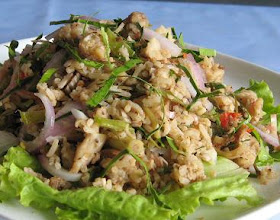 |
| A mountain of herbaceous bounty |
He's also a finicky eater. For a recent family gathering, my mother and aunt cooked up an array of wonderful dishes but his mum had to buy a packet of restaurant food for him just to get him to eat something.
My sister-in-law also got a few pieces of fried fish to share with everyone, but because there was so much food, the dish was practically ignored. The restaurant fish really didn't stand a chance against anything the two mothers had prepared, so when it was time to pack up the food, I decided to take the fish home with me and use it along with tons of herbs in a Nasi Ulam (herbed rice).
Nasi Ulam is a mixture of white rice, salad greens, herbs and edible wild plants, sambal and grated coconut. I first ate this dish as a youngster in my hometown in the north of Peninsular Malaysia. It was delicious, and I would pester my mother for it all the time. Unfortunately, it was only available during the Muslim fasting month of Ramadan at the market set up just for this period before the celebration of Eid.
Well, I finally learned how to make it some years ago and while the different ulam or green herbs are not always easy to get and the preparation is a little time-consuming because of all the shredding and toasting – now I understand why the dish wasn't always available – I don't mind the work because it is so tasty (the recipe below serves four, but believe me, I can finish it myself in two sittings!) Except for the rice and fish (and this makes good use of leftovers), everything is raw.
 |
| Two of the ingredients that go into Nasi Ulam |
NEXT UP: Kerabu!
Serves 4
2 cups cooked white rice
250g grilled or fried fish, remove bones and flake the flesh
2 tablespoons dried prawns, soaked to soften, then finely pounded
3-4 tablespoons ready-made kerisik
3 shallots, thinly sliced
3-4 stalks lemongrass (white part only) shredded
1 ginger flower (bulb section), shredded
1-1½ tablespoons palm sugar
¼ cup lime juice, or to tasteSalt and pepper to taste
Sambal Belacan
2 large red chillies, roughly chopped
1 teaspoon dried shrimp paste
- Pound both ingredients together into a fine paste.
Most, if not all, these herbs can be bought at the market. They're said to have medicinal properties. Shred all the leaves finely. As an approximate, use about 2 tablespoons of each of the shredded leaves.
Daun kesum (Vietnamese mint leaf or laksa leaf)
Daun kunyit (turmeric leaf)
Daun limau purut (kaffir lime leaf)
Daun kaduk (wild betel leaf or wild pepper leaf)
Daun pegaga (pennywort)
- Once all the ingredients are prepared, mix them together in a large bowl. Don't forget to season to taste. This is best eaten as soon as possible. Out of the refrigerator, the herbs lose their colour and freshness when heated up and the oil from the kerisik hardens.

No comments:
Post a Comment
Your views are welcome and appreciated. Have a nice day!